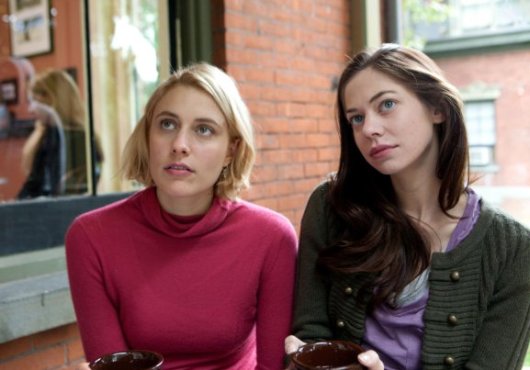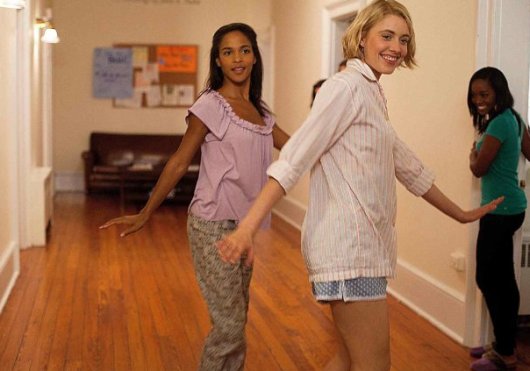
Marbled Wonderland
by SARAH LABRIE
Damsels in Distress
dir. Whit Stillman
97 minutes
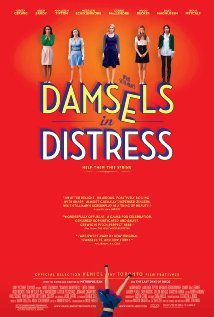 People like to give Whit Stillman a hard time for making movies about rich people who only care about themselves, but really he makes movies about rich people who care a lot about bad dancing. Metropolitan, Last Days of Disco and Barcelona all promote terrible dancing in public as a therapeutic pastime. Damsels in Distress — Stillman’s first feature in more than a decade — is also his first to elevate the bad dancing/therapy dichotomy to a cure for all life’s social ills. I, for one, came away convinced.
People like to give Whit Stillman a hard time for making movies about rich people who only care about themselves, but really he makes movies about rich people who care a lot about bad dancing. Metropolitan, Last Days of Disco and Barcelona all promote terrible dancing in public as a therapeutic pastime. Damsels in Distress — Stillman’s first feature in more than a decade — is also his first to elevate the bad dancing/therapy dichotomy to a cure for all life’s social ills. I, for one, came away convinced.
Damsel’s heroine Violet Wister (Greta Gerwig) dreams of “changing the course of human history” by inventing an international dance craze. In off hours she tries to reform the Roman Letter Clubs (Stillman’s version of frats) of Seven Oaks College by showing up at their parties and waving her arms around. She’s a junior, I think, but she doesn’t ever talk about summer internships or studying abroad. She’s sacrificed a four-year education for loftier ambitions, like the prevention of suicide in the student body’s depressive population through tap.
With her normal-person body, gargantuan smile and eyebrows that don’t match her hair, Gerwig’s Violet is hard not to love. She’s the least movie-star-pretty girl in her posse of ladies, which means, of course, she is the leader. Her sidekicks, Rose and Heather glitter like they got lost on the way to a Gossip Girl shoot but they turn up mostly to protect Violet’s ego, along with the free donut box at the suicide prevention center where she volunteers.
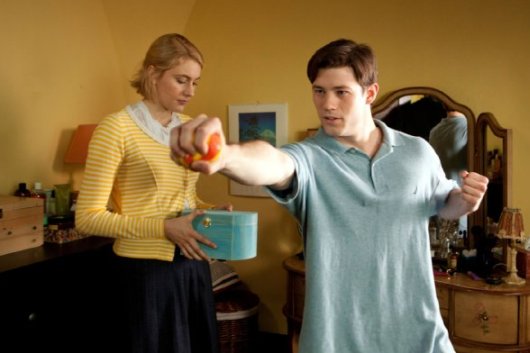
Part of the reason we love Violet is that she fails and fails again. Nobody shows up for the premiere of her international dance craze, and in spite of her best efforts, students keep jumping off buildings. Still, she never so much as doubts herself and for this, she deserves a spot among the Katniss Everdeens and Lisbeth Salanders of the season, if not a throne in movie heaven next to Tracy Flick.
We all know people who claw through life cheerfully deluded, but oftentimes when these people show up in movies, they have penises. Violet has floral silk dresses and a Kate Spade full of good intentions. In the same way Young Adult gave us a female lead who, over the course of a two-hour film, didn’t learn anything or change, Stillman gives us Violet Wister and her all-consuming dedication to beautiful things that don’t matter.
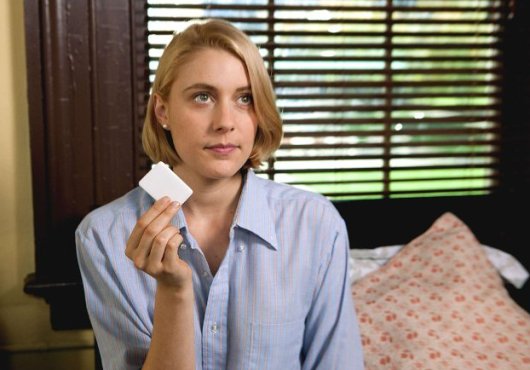
If the whole set-up sounds twee, know that on screen Violet’s perspective comes off as darkly nihilistic. She wants to live in imaginary universe free of aggression, hostility, stupid nicknames, body odor, porn, politics, history or the Internet — a marbled, antiseptic female wonderland where perfume and a pastel dress code are strictly enforced. “In some ways, it is distinctly Whit Stillman,” Gerwig said in an interview, “but in other ways, it’s totally — it’s like an alien made it. But in a good, interesting way.”
Opposite Violet, we get Lily (Analeigh Tipton), a new student at Seven Oaks with baby deer eyes and a teensy-tiny head. We know right away Lily is trouble because she doesn’t wear dresses and she refuses Violet’s offer of a makeover. At first Stillman tries to pit Lily and Violet against each other but Violet doesn’t stand for negativity. Lily calls Violet arrogant and Violet thanks her for her “chastisement”. Lily calls Violet nosy and Violet vows to improve herself. Lily calls Violet crazy and Violet agrees. Lily calls Violet’s boyfriend Frank, “a moron,” and Violet tells her she’s being “a bit harsh.”
Over the course of Damsels, nothing changes, nobody yells at anyone, and nobody makes any decisions. In the end, the whole cast dances and then dances some more. Also, a frat boy who can’t name his colors sees a rainbow. I left the theater thinking, “Nothing as amazing as watching that movie is going to happen to me all year.” (Also: “Why isn’t Adam Brody in more things?”)
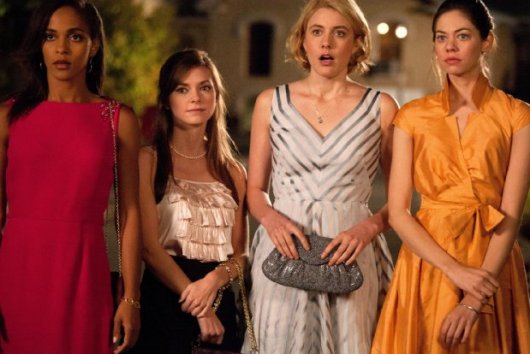
Seeing Greta Gerwig in Stillman’s shiny snow-globe of a universe is off-putting. So is watching her recite his blueblood-inflected dialogue. Gerwig got her start in grimy no-budget festival movies like Hannah Takes the Stairs and Nights and Weekends. (In Hannah she plays the trumpet naked in a bathtub with Kent Osborne and in Nights she has actual sex with Joe Swanberg on the floor.) Neither feature required her to memorize lines or finish sentences. Her presence in this film, at first, feels like a calculated wink to moviegoers who knew who Gerwig was before Greenberg. Probably, it is. Supporting actors include Alia Shawkat of Arrested Development, Aubrey Plaza from Parks and Recreation, Caitlin Fitzgerald and Hugo Becker of Gossip Girl, Zach Schwartz from The Office and Brody who will never need his credits listed. A consulting producer is Alicia Van Couvering who also produced Lena Dunham’s Tiny Furniture and Nobody Walks. Dunham was supposed to be in Damsels as was Chris Eigeman, but they both dropped out to do the Girls pilot.
Casting these actors helps Stillman prove he’s still hip in all his premeditated unhipness. It also meant he didn’t have to pay anybody movie star asking prices. Thanks to Damsels’ small budget, Stillman doesn’t need to pander to anybody to make his money back. He can include his weirdo P.G. Wodehouse dialogue and not cater to anybody’s narrative expectations but his own.
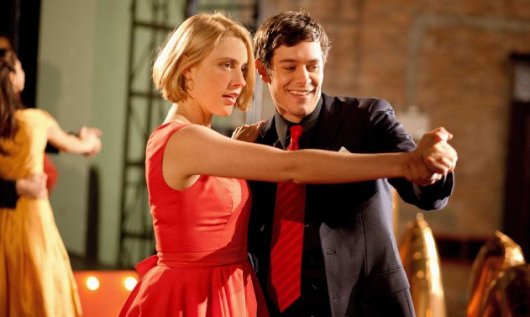
Untrammeled freedom isn’t always a good thing though, and parts of Damsels are genuinely bad. One of the damsels can’t act at all, and only one of the frat boys can. Some lines landed on the audience not so much with a thud as with the nervous through-the-nose exhale people reserve for New Yorker cartoons, or unfunny friends whose feelings they don’t want to hurt. “What was that?” asked the woman behind me as the credits rolled. “Whose idea was that movie?”
She probably wasn’t the only person who felt that way. One major critique I imagined coming out in reviews is that it’s tone-deaf to politics. The world the Damsels live in looks more like the Clueless era than this modern age of scrambling economics majors and unemployed law school graduates. But just because an agenda isn’t timely doesn’t mean it’s not relevant. What people who rail against the film’s superficial materialism are missing is that a major theme of Damsels is the decline of decadence. Adam Brody writes a paper on the topic and Violet and her posse attend a drunken frat boy bacchanal.
Perched on top of a rock situated high above the brawling mass of oafs, animals, spilled beer and toilet paper, Violet muses, “This is what happens when decadence infiltrates a society from within… such a society is destined to be overrun. Maybe that’s a good thing.” For all her oblivious insanity, you’d be hard pressed to argue she’s not making a valid point.
Sarah LaBrie is the senior contributor to This Recording. She is a writer living in New York. She tumbls here. She last wrote in these pages about Jennifer Egan. You can find an archive of her writing on This Recording here.
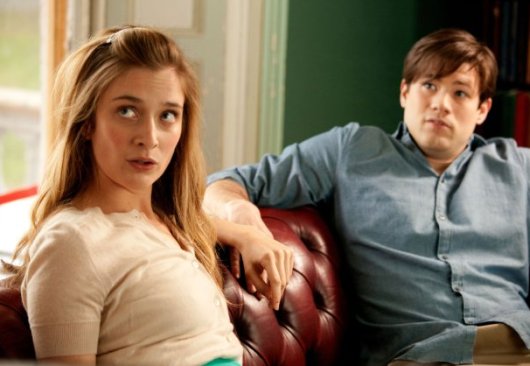
"At the Table of the Styx" - Will Stratton (mp3)
"If You Wait Long Enough" - Will Stratton (mp3)
The latest album from Will Stratton, Post-Empire, was released on February 12th.
